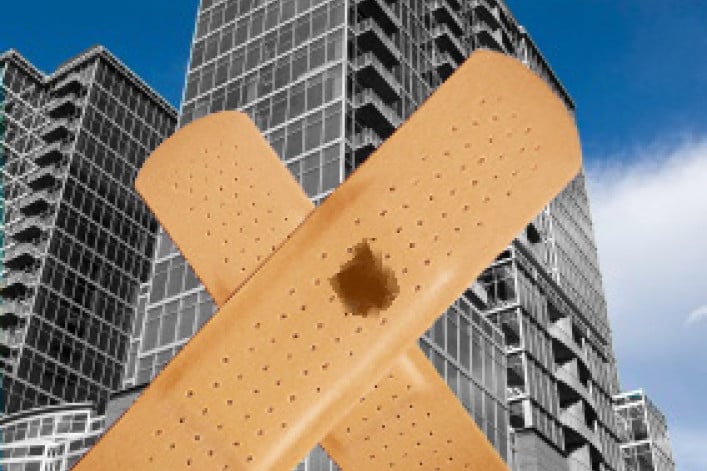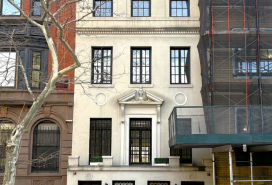The top 7 construction defects, and how not to be a sucker

[Read BrickUnderground's 2013 Construction Defect Update here]
By now, we hope that anyone who buys a new condo understands that “new” doesn't mean “perfect.” Every freshly minted building has problems that can range from buckling floors, to cooling systems that sound like a Fresh Direct truck parked outside your window, to leaky roofs that can cost tens of thousands of dollars to repair.
If you are in the market to buy and this is news to you, or you and your neighbors are just starting to compare punch lists, you may want to get educated on the things that can go wrong.
“Some of these problems are fundamental—you would not expect new roofs to be leaking or a recently constructed building to have exterior deficiencies,” says Peter Varsalona, a professional engineer at RAND Engineering & Architecture, which has conducted around 120 survey reports for new and converted condominium buildings during the past eight years. “A lot of it is quality control—maybe the developers didn’t want to spend extensive money on inspections, or a contractor was not paid, or they were racing to complete these projects as soon as possible because they’ve got to sell them. By the time we’re called in, it’s too late.”
The types and frequency of defects have been pretty constant over the past decade, says Varsalona, and tend to cluster in 7 different categories:
1. Exterior leaks The most common problems, which also happen to be the most expensive to fix, are leaks in the building’s protective envelope, roofing and exterior insulation. “Roofing tends to be something that’s cut back on the most,” says Varsalona. “There are so many different qualities of roof systems. Some are seamless, while others are less expensive and you don’t get as long of a warranty.” Warranties can range from non-existent to 20 years with no dollar limit.
As far as exterior walls, says Varsalona, “Each system has insulation requirements and often contractors don’t follow them properly, which results in early defects usually visible right away. Once moisture does get in, there is no way to get it out. It leaks inward and causes damage inside the apartment—you’d be surprised how many buildings we go into and find mold.”
2. Windows that don’t work: Fashionable acres of glass apparently yield large crops of frustration. “It's a big issue,” says Varsalona. “The operation of windows can be a big deal. The failures we see are often in the window locks, failure to open, failure in gaskets or drafts in window perimeters. Often you need to bring in a window repair company and go case by case.”
3. Sloppily installed or defective wood floors: “In almost every inspection we do, we hear complaints about flooring,” says Varsalona. “They’re cupping upward, the finish is not correct, they’re warped, there are big gaps between the boards. People expect pretty much as perfect a floor as can be and often it will be an engineered floor system or flooring not properly installed. The cupping often happens as a result of leaks—things that you don’t expect in brand new construction.”
4. AWOL fire proofing: Many buildings are missing the caulking or other type of fireproofing material designed to prevent fire from spreading through the gaps around piping.
5. Bad ventilation: Owners often complain about bad ventilation in public hallways, or inadequate exhaust in bathrooms or kitchens. Varsalona says he often finds deficiencies in the way ventilation was installed.
6. Heating & cooling problems: “Many new condos tend to use heat pumps to generate both heat and a/c. It’s the least expensive. And though residents buying into a luxury condominium may think they’re getting a customized high-end system with simultaneous heating and cooling capabilities and enhanced humidity control, they complain about poor heat and inadequate air conditioning,” says Varsalona.
7. Inferior substitutions: “A huge disclaimer inside the offering plan gives the sponsor the right to make substitutions of ‘equal quality or better,’ and that’s a very subjective area,” says Varsalona. “We see a lot of clear noncompliance with offering plans. For example, the sponsor that is supposed to provide carpeted hallways with paneling on the walls and a sheetrocked ceilings with coves instead puts in painted concrete with wallpaper and ceiling tile or no dropped ceiling. Or owners will go to a showroom and see certain tile and finishes for countertops, but they get Corian or some other type of non-stone countertop that the developer claims is equal. Or instead of a certain plumbing fixture, the developer throws in Kohler. The showroom doesn’t match what you get or the models don’t jive.”
So if you're looking to buy now, how big a bag might you be left holding?
The cheapest way to predict is by doing some detective work on the developer.
“It’s very obvious that certain developers constantly have the same kind of problems, such as clear non compliance with offering plans,” says Varsalona. “Check with the New York State attorney general’s office for claims filed, check with real estate brokers or buyers’ brokers, check with other owners.”
Engineers like Varsalona charge around $4,000-$5,000 to help evaluate the risk through inspection. (Larger–scale “defect surveys” of the entire building conducted for the condo board start at approximately $25,000 and can go up to $50,000 or so, depending on the size and complexity of the building.)
“You want a property licensed professional engineer to to look at other parts of the building and survey areas the sponsor doesn’t want to show you,” he says.
Related posts:
The 7 most common construction defects: BrickUnderground's 2013 Update
4 neat ways to use an investigative lawyer
























